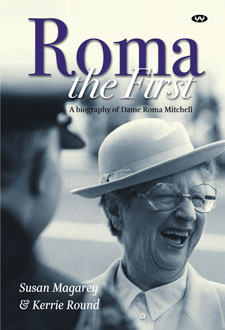When Roma Mitchell studied law at the University of Adelaide in the 1930s, she couldn't join the Law Students' Society. She wasn't eligible to take part in moots " where students were trained in legal argument. She couldn't go to any tutorials. When she graduated, she wasn't allowed to attend formal gatherings of her profession.
Why? Because of her sex.
As they say, the past is another country: they do things differently there.
 Yet with quiet diligence and without ever resorting to noisy protest, Roma Mitchell qualified to legal practice and became the first Australian woman to be appointed Queen's Counsel, the first to be made a judge, the first to be elected chancellor of a university and the first to be appointed a state governor.
Yet with quiet diligence and without ever resorting to noisy protest, Roma Mitchell qualified to legal practice and became the first Australian woman to be appointed Queen's Counsel, the first to be made a judge, the first to be elected chancellor of a university and the first to be appointed a state governor.
Hence, Roma the First.
She was a devout Roman Catholic all her life, never missing weekly mass wherever she was in the world " and she travelled very widely indeed.
The authors, Susan Margery and Kerrie Round, both historians at the University of Adelaide, have much to say about her religious adherence. Dame Roma's ancestral Irish Catholicism they see as another focal point for prejudice which she had to overcome, in order to succeed (since South Australia, apparently, has a lower Roman Catholic proportion of its population than any other mainland state.)
They think it surprising that despite such origins, Roma Mitchell supported constitutional monarchy her whole life and accepted the honours that emanated from it.
They really ought to know better. In a country with so little major civil conflict to mention, Australian academics seem drawn to exaggerate the sectarian prejudices of former generations. Yet even in that supposedly most protestant of Australian states, Dame Roma was 130 years too late to be the first Roman Catholic in Adelaide's Government House.
When she died in 2001, the authors were granted access to the private papers of her estate. They also seem to have spoken to many of her friends.
Perhaps it is because these sources don't shed any light on her personal beliefs, that apart from their subject's denominational membership and regularity in attendance until her death bead, this biography strangely omits any discussion as to the particular character of her Christian faith.
Roma Mitchell was a prominent laywoman in a time of profound change in Roman Catholicism following the Vatican II conference " yet no mention is made of what she thought of these events; nor about how this pioneer of women's rights viewed the nascent controversy over the limiting of her church's priesthood to men.
Roma Mitchell devoted much of her career to promoting the rights and dignity of the individual. She was a state and national chairman of the Ryder-Cheshire Foundation, devoted to the needs of people with disabilities. She chaired the Fraser Government's Human Rights Commission. When not running a charitable or benevolent organisation, she was a keen participant. Without ever holding a driver's licence, she was on the Meals on Wheels roster!
Did the gospel influence her embrace of these causes? Was she inspired by the example and teachings of Jesus? Who can say? The authors simply avoid any discussion of her spiritual life altogether.
Since Dame Roma never married, this biography, as nowadays seems all but obligatory, speculates somewhat fancifully, if amiably, on the character of some of her most intimate friendships.
Roma Mitchell's life is set in its context with a good deal of social history. She was a pioneer of women's rights, but so was the South Australia into which she was born " the first colony to embrace women's suffrage. We read also about the unique era of 1970s Adelaide, its flamboyant reforming premier, Don Dunstan, and the Chief Justice he appointed, John Bray. Roma Mitchell served on Bray's court; and headed a controversial inquiry into Dunstan's dismissal of the State's Police Commissioner, Harold Salisbury.
None of the many photographs of Dame Roma in this book fails to show her with a smile on her face. Her personality, as it emerges from these pages, is of one who loved life and relished the recognition her achievements earned her.
Roma the First is not a critical analysis of a legal career or a public life; nor is it a psychological portrait for the edification of the emotionally curious. This is, rather, a literary act of homage by two scholars at the university she once led, and who clearly admire her.
Yet, by passing over their subject's spiritual life in silence, they ultimately let her readers down, by ignoring what may well be the key to understanding this eminent yet private woman " her lifelong relationship with her Lord and Saviour.

























